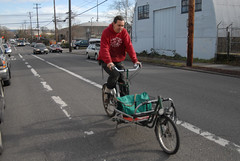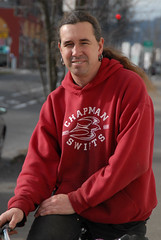[Welcome to Part Two of our three-part series on bike messengers in Portland.
This series is written by BikePortland contributing writer Erin Greeson (bio). In Part One, Greeson laid out the tough working conditions faced by Portland’s messengers. In the article below, she shares finding health care coverage for a messenger who’s also a mom and she delves into the impact of the messenger stereotype.]
“To some people, the idea of bike messenger work is about ultimate freedom…but perhaps some degree of stability is what workers really need.”
— Meghan Mack, messenger and mom
As millions of Americans can attest, life without health care is stressful and dangerous for both individuals and families.
Meghan Mack is a Portland bike messenger and mother who found that her wages could not cover the cost of crucial family care. Meghan was determined to obtain health coverage for her child and herself and fought hard to find a solution.
“It takes a lot to find the aid that you need,” she said, citing the complexities of paperwork, deadlines and spiraling webs of bureaucracy. Meghan and her child qualified for Oregon Health Plan coverage for a period of time, but the coverage eventually terminated. Looking for other options, she investigated and found out about the Family Health Insurance Assistance Plan (FHIAP).
Hopeful about the FHIAP, Meghan shared the information with her messenger colleagues. Her friend Dee Branham managed to secure a place on the FHIAP waiting list, but he was told that the list would remain immobile for an undetermined time period, due to overwhelming public need.
“To some people, the idea of bike messenger work is about ultimate freedom,” Meghan said, “But perhaps some degree of stability is what workers really need.” Meghan is but one of several Portland messengers who work not as individuals, but as parents who make family the priority.
In addition to difficult working conditions, bike messengers often confront stereotypes based on generalized public perceptions. Just as some bike commuters get frustrated when others run red lights for fear that it might give everyone a bad name, bike messengers face what appears to be a universal dilemma: a few messengers conspicuously disobey traffic laws, and the general public tends to apply the stereotype to all.
“Most of us don’t run red lights,” Gideon Telford explained. “Most of us stop!”
“The greatest challenge that I face is overcoming the stereotype of the bike messenger as unskilled labor; as a young, irresponsible, wanton law-breaking hooligan of the streets. I view myself as a tradesperson, and I am very proud of my capabilities.”
— Joel Metz, bicycle messenger
As I got to know several messengers through my work at a downtown business, I found myself repeatedly defending them when people would complain of rude riding or their “attitudes.” I understand public frustration toward instances of disrespect on the road, but the broadly applied stereotypes did not reflect the work style of Telford and other messengers who I had come to know.
For example, Joel Metz is a distinctive leader in the Portland bike messenger community. His long ponytail, front-loader cargo bike and kind demeanor are hard to miss. Metz shared some personal insights about negative misconceptions that impact his life.
“The greatest challenge that I face is overcoming the stereotype of the bike messenger as unskilled labor, as a young, irresponsible, wanton law-breaking hooligan of the streets,” Metz explained, “I view myself as a tradesperson, and I am very proud of my capabilities as a messenger.”
Through his years of hard work, Metz accumulated enough savings to purchase a home. Metz noted that he makes health insurance a priority because of its inherent link to his ability to come up with a mortgage payment.
After all, he explained, “An unexpected injury or unexpected health care costs could jeopardize my status as a homeowner.”
— In the final installment, Part Three (now published), we’ll end on a more positive note with a look at ways messengers can organize to support themselves and the future of their profession.




